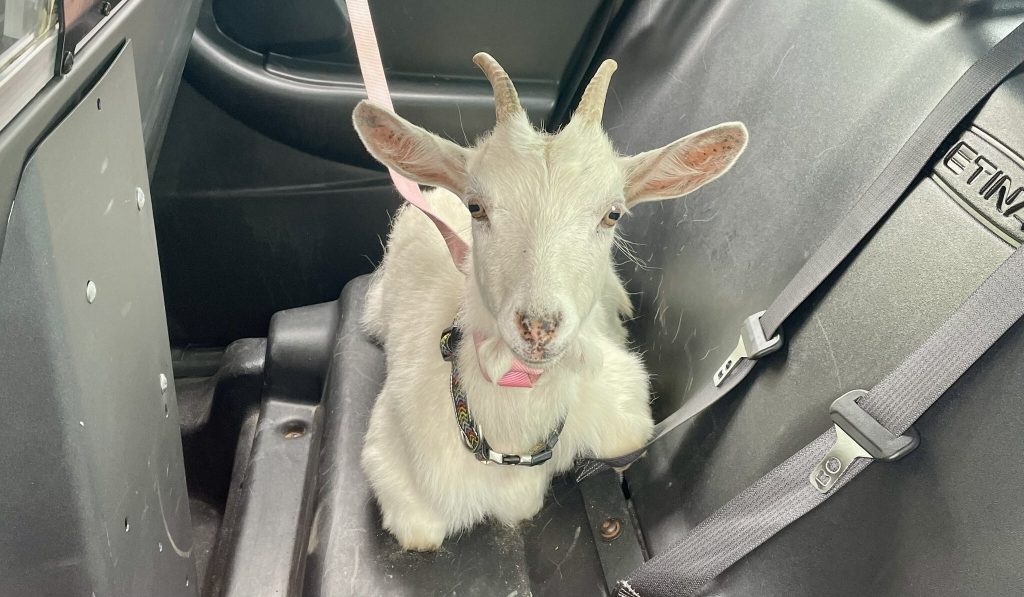Former med student continues quest to positively impact Ottawa organic farming industry
Posted Apr 14, 2021 01:42:00 PM.
A former med student at McGill University is becoming a leading voice for organic farming in Ottawa.
“Medical school wasn't for me,” Jonathan Bruderlein, 35, says. “I needed a tangible way to have an impact on the lives of others. It's about service, helping people.”
“I wanted to help people when I was a kid,” says Bruderlein, who grew up in Geneva, Montreal and New York to be close to his grandmother, a UN activist. “I wanted to be that Greenpeace guy in the Zodiac in front of the whaling ship. I wanted to make the world a better place.”
So, after years studying agronomy and working organic farms across the U.S. and Canada, Bruderlein and his wife Jolianne Demers landed on 110-acres of NCC property at 2811 Ramsayville Rd., the original Ramsay farm last June, where they're building their organic farm, event centre and playground Ottawa Farm Fresh.
“Organic farming makes life possible,” he adds. “In organic farming we say 'feed the soil, not the plant.' The soil is a living thing. It's full of micro-organisms. It needs to be fed.”
Now in its second growing season, Ottawa Farm Fresh grows 115 varieties of “high-intensity vegetables” such as spinach, arugula, salad mix, tomatoes, onions, shallots, kale, swiss chard, peppers, carrots, eggplants and fruits that do well in Ottawa's soil. They also sell heirloom veggies, seedlings and gift packs online and on their Facebook page.
The year's first crop will be available at their roadside stand on May 20, or, for an annual fee, subscribers can get fresh vegetables every week until the end of October. They've already sold 225 subscriptions for this year's crop.
In addition to running his own business, Bruderlein also coaches farmers on best practices for running an organic farm profitably “so they make money without having to work 80 hours a week.”
“It's not that it's hard to make money in organic farming,” he explains. “It's just really easy to not make money. I show farmers how to do more with less.”
The guy who calls himself Farmer Jonathan talks about organic farming with the zeal of a social activist. Which is, in a way, exactly what he is. He wants to do more than grow and sell organic veggies. He sees their farm as an organic destination where consumers can enjoy live music, yoga in the field, family picnics, a coffee bar, a playground for the kids and workshops on organic farming.
However, Bruderlein's journey from med school to the farm isn't quite as quixotic as it might sound. Beneath the free-spirited organic entrepreneur lurks an independent businessman and entrepreneur who regards industrial farming as one of the biggest health threats facing farmers and consumers today.
“The easiest way to farm without getting cancer is to farm organically,” Bruderlein says. “Farming has been dominated by chemists since World War II. Imagine if we have 60 years of research into epigenetics, microbiology and biochemistry. If we had that, organic would be at the same level as industrial farming.”
“We often think pesticides are bad for the consumer. But think about the farmer who's spraying his crops with a jug of pesticides in his hands and the farmer's kids who live next to that. I don't want to live in a place my kids aren't safe in.”
The other reason organic farming is, according to Bruderlein, the wave of the future, is the taste and nutritional value of commercially grown produce. Sure, it looks great, but who hasn't eaten a tomato, cucumber, cantaloupe, the list goes on, that tastes like water because they were pumped up, picked prematurely and processed on industrial farms in California weeks ago, then shipped thousands of miles so they can be available year round at your local grocery store.
“Fresh, local food tastes better because it didn't grow up so fast, wasn't boosted with water,” he explains. “Commercial farms rely on soluble chemicals for large yields. That's like saying you can technically live on Mars bars, dietary fibres and multi-vitamins. But is that the best result for a human? No. Organic vegetables have more sugars, nutrients and flavours.”
“Farming isn't a career,” he adds. “It's a way of life. They say if you do what you love, you'll never work a day in your life. But you won't get a day off either. I don't mind. I love it.”








